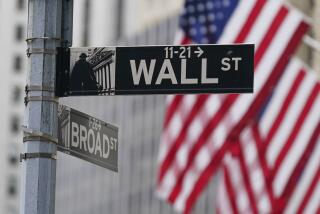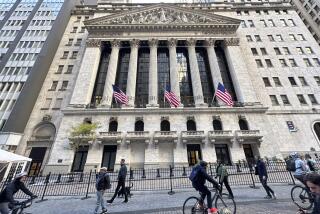Stocks steadily drop, but analysts don’t foresee a correction
NEW YORK — Investors are yanking money out of stocks, but Wall Street analysts don’t seem worried a correction is in the offing.
Stocks have steadily fallen this month, with the Dow Jones industrial average coming off five straight losing sessions and the broader Standard & Poor’s 500 index briefly touching its lowest level in two months. The latest market jolt was fueled by fears that French and Greek elections will cast doubt about the continent’s ability to contain its debt crisis, analysts said.
The Wall Street adage “Sell in May and go away” is fresh on the minds of jittery investors. But traders and money managers contend the market is in the midst of a consolidation — and did not express fear that a correction would plunge major indexes down 10% or more.
“With a market that moved up so quickly, so forcefully, you are going to see a pullback,” said Quincy Krosby, a market strategist forPrudential Financial Inc.
The S&P 500 is up a whopping 21% since Oct. 3, 2011, and 8.4% this year. But major U.S. stock indexes have fallen a little more than 2% since the start of the month.
Stocks were perhaps the most volatile Tuesday, when markets dropped globally on fears of further economic turmoil in the Eurozone. The Dow closed down 76.44 points, or 0.6%, at 12,932.09 — but was down nearly 200 points earlier in the session.
Broader U.S. stock measures also recovered from steep losses earlier in the session. The S&P 500 dropped 5.86 points, or 0.4%, to 1,363.72. The technology-heavy Nasdaq composite gave up 11.49 points, or 0.39%, to 2,946.27.
“The market is slowly acknowledging that the slowdown in Europe is real, that these structural problems take longer to solve,” said Larry Palmer, managing director at Morgan Stanley Smith Barney Private Wealth Management in Los Angeles.
He pointed out that some of the fear is that problems in Europe could spill over to U.S. firms, especially because an estimated 15% of S&P 500 companies’ fortunes are tied heavily to Europe. With more than half a dozen European countries in a recession, Palmer said Wall Street might have to readjust earnings expectations for the rest of the year.
Investors are “just going to get more cautious until they see some light at the end of the tunnel, and right now there’s a lot of uncertainty out there on a host of fronts,” he said.
But these jitters aren’t expected to push U.S. stocks into a free fall. Palmer said fears of a correction in the markets may be unfounded given how much cheap money — via low interest rates — central banks around the world are pumping into the global economy.
Sean Kelly, managing director and head of the equity trading desk at Knight Capital Group, said some of Tuesday’s turbulence was due to light trading a day earlier. Markets in London were closed Monday because of a holiday, so those investors were late to weigh in on Europe’s elections.
“There was just nobody in the sandbox to play with,” Kelly said.
He characterized the early sell-off Tuesday as “very organized” and “limited.”
“There’s been no panic selling,” he said.
Although Europe’s problems have investors on edge, Kelly said, “now you’re seeing some people just take a little money off the table just to be prudent.”
Investors moved $75 billion out of stocks Tuesday, according to the Wilshire 5000 Total Market Index.
Their hunger for the relative safety of cash pushed down yields on U.S. Treasury bonds. The yield on the benchmark 10-year note fell to 1.84% — the lowest since early February.






